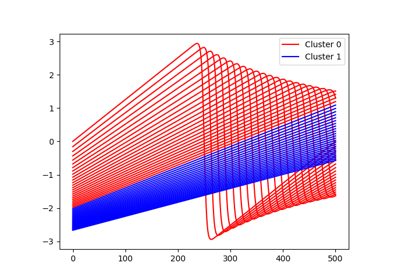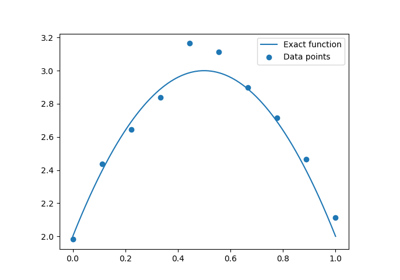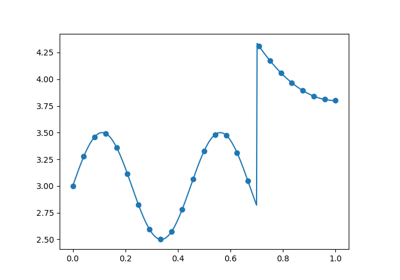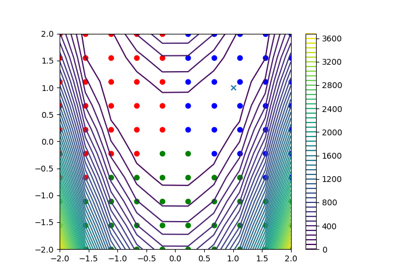api module¶
Machine learning API.
The machine learning API provides methods for creating new and loading existing machine learning models. It also provides methods for listing available models and options.
- gemseo.mlearning.api.create_classification_model(name, data, transformer={'inputs': <gemseo.mlearning.transform.scaler.min_max_scaler.MinMaxScaler object>}, **parameters)[source]¶
Create a classification model from a learning dataset.
- Parameters:
name (str) – The name of the classification algorithm.
data (Dataset) – The learning dataset.
transformer (Mapping[str, TransformerType] | None) –
The strategies to transform the variables. Values are instances of
Transformerwhile keys are names of either variables or groups of variables. If None, do not transform the variables.By default it is set to {‘inputs’: <gemseo.mlearning.transform.scaler.min_max_scaler.MinMaxScaler object at 0x7f3c39520520>}.
parameters – The parameters of the classification model.
- Returns:
A classification model.
- Return type:
- gemseo.mlearning.api.create_clustering_model(name, data, transformer=None, **parameters)[source]¶
Create a clustering model from a learning dataset.
- Parameters:
name (str) – The name of the clustering algorithm.
data (Dataset) – The learning dataset.
transformer (Mapping[str, TransformerType] | None) – The strategies to transform the variables. Values are instances of
Transformerwhile keys are names of either variables or groups of variables. If None, do not transform the variables.parameters – The parameters of the clustering model.
- Returns:
A clustering model.
- Return type:
- gemseo.mlearning.api.create_mlearning_model(name, data, transformer=None, **parameters)[source]¶
Create a machine learning algorithm from a learning dataset.
- Parameters:
name (str) – The name of the machine learning algorithm.
data (Dataset) – The learning dataset.
transformer (Mapping[str, TransformerType] | None) – The strategies to transform the variables. Values are instances of
Transformerwhile keys are names of either variables or groups of variables. If None, do not transform the variables.parameters – The parameters of the machine learning algorithm.
- Returns:
A machine learning model.
- Return type:
- gemseo.mlearning.api.create_regression_model(name, data, transformer={'inputs': <gemseo.mlearning.transform.scaler.min_max_scaler.MinMaxScaler object>, 'outputs': <gemseo.mlearning.transform.scaler.min_max_scaler.MinMaxScaler object>}, **parameters)[source]¶
Create a regression model from a learning dataset.
- Parameters:
name (str) – The name of the regression algorithm.
data (Dataset) – The learning dataset.
transformer (Mapping[str, TransformerType] | None) –
The strategies to transform the variables. Values are instances of
Transformerwhile keys are names of either variables or groups of variables. If None, do not transform the variables.By default it is set to {‘inputs’: <gemseo.mlearning.transform.scaler.min_max_scaler.MinMaxScaler object at 0x7f3c395040d0>, ‘outputs’: <gemseo.mlearning.transform.scaler.min_max_scaler.MinMaxScaler object at 0x7f3c39504070>}.
parameters – The parameters of the regression model.
- Returns:
A regression model.
- Return type:
- gemseo.mlearning.api.get_classification_options(model_name, output_json=False, pretty_print=True)[source]¶
Find the available options for a classification model.
- Parameters:
- Returns:
The options schema of the classification model.
- Return type:
- gemseo.mlearning.api.get_clustering_options(model_name, output_json=False, pretty_print=True)[source]¶
Find the available options for clustering model.
- Parameters:
- Returns:
The options schema of the clustering model.
- Return type:
- gemseo.mlearning.api.get_mlearning_options(model_name, output_json=False, pretty_print=True)[source]¶
Find the available options for a machine learning algorithm.
- Parameters:
- Returns:
The options schema of the machine learning algorithm.
- Return type:
- gemseo.mlearning.api.get_regression_options(model_name, output_json=False, pretty_print=True)[source]¶
Find the available options for a regression model.
- Parameters:
- Returns:
The options schema of the regression model.
- Return type:
- gemseo.mlearning.api.import_classification_model(directory)[source]¶
Import a classification model from a directory.
- Parameters:
directory (str | Path) – The path to the directory.
- Returns:
A classification model.
- Return type:
- gemseo.mlearning.api.import_clustering_model(directory)[source]¶
Import a clustering model from a directory.
- Parameters:
directory (str | Path) – The path to the directory.
- Returns:
A clustering model.
- Return type:
- gemseo.mlearning.api.import_mlearning_model(directory)[source]¶
Import a machine learning algorithm from a directory.
- gemseo.mlearning.api.import_regression_model(directory)[source]¶
Import a regression model from a directory.
- Parameters:
directory (str | Path) – The path of the directory.
- Returns:
A regression model.
- Return type:



















